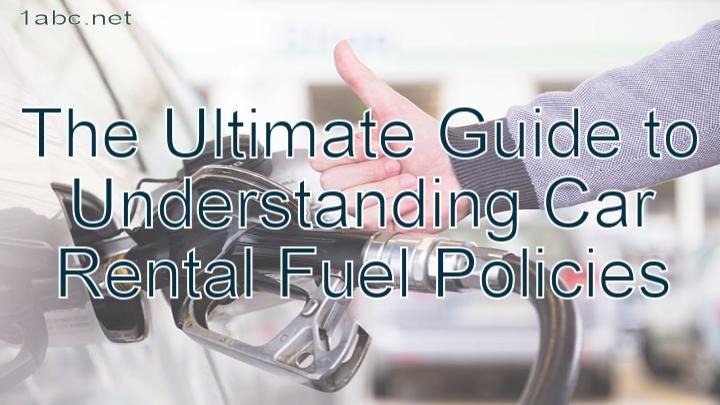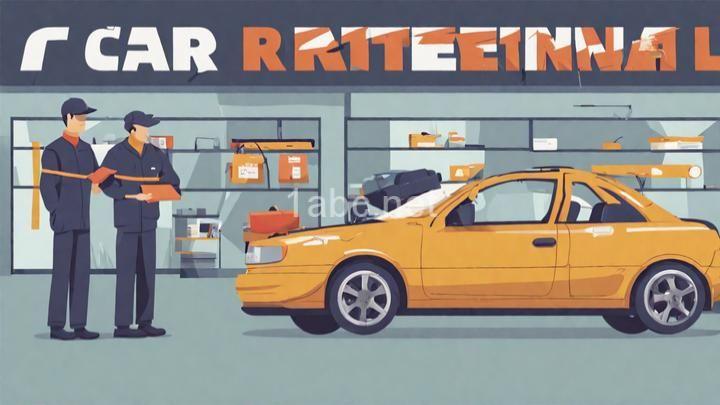The Ultimate Guide to Understanding Car Rental Fuel Policies

Introduction:
Welcome to the ultimate guide that will help you navigate through the often confusing world of car rental fuel policies. We understand that understanding these policies can sometimes be overwhelming, which is why we are here to simplify the process and provide essential information. As your friendly and knowledgeable guide, we will walk you through the different types of fuel policies, common misunderstandings, and offer tips to optimize your car rental experience.
I. Why Understanding Car Rental Fuel Policies Matters:
It is crucial to understand fuel policies before renting a car for several reasons. First and foremost, being aware of these policies can help save you money. Rental companies often charge significantly higher prices for fuel if you return the car without a full tank. By understanding the fuel policy, you can avoid these additional charges and only pay for the fuel you have used.
Moreover, understanding car rental fuel policies can prevent unexpected charges. Some policies may require you to return the car with a specific amount of fuel, and failing to do so may result in penalties or fees. By familiarizing yourself with these policies, you can ensure a smooth rental experience without any surprises.
II. Types of Car Rental Fuel Policies:
A. Full-to-Full Policy:
The full-to-full policy is one of the most common fuel policies. Under this policy, you receive the vehicle with a full tank of fuel, and it is expected that you return it in the same condition. This means you need to refill the tank before returning the car to the rental agency.
To make the most of the full-to-full policy, it is essential to plan ahead. Research nearby gas stations and find the most convenient option for refueling. This way, you won't be scrambling to find a gas station at the last minute, potentially paying higher prices or driving extra miles to find a station.
B. Prepaid Fuel Policy:
The prepaid fuel policy allows customers to pay for a full tank of fuel upfront. With this policy, you have the flexibility to return the vehicle with any amount of fuel remaining. However, keep in mind that you will not receive a refund for any unused fuel.
Whether the prepaid fuel policy is suitable for you depends on your travel plans and estimated fuel usage. If you anticipate using a significant amount of fuel during your trip, the prepaid option might be the most convenient. On the other hand, if you plan on driving short distances and can estimate your fuel needs accurately, the full-to-full policy may be a better choice.
C. Partial Refund Policy:
Some rental companies offer a partial refund policy, which allows you to return the vehicle with less than a full tank and receive a refund for any unused fuel. This policy can be advantageous if you don't want to worry about refueling before returning the car but still want to avoid paying for unused fuel.
To calculate potential savings under the partial refund policy, it is important to understand the rental company's refund calculation. Some companies may have specific requirements or limitations, such as a minimum fuel level or a maximum refund amount. Familiarize yourself with these details to optimize your savings.
III. Common Misunderstandings about Car Rental Fuel Policies:
A. "I can return the car with any amount of fuel remaining."
This assumption is incorrect and may result in additional charges. Rental companies clearly outline the fuel requirements in the rental agreement, and failure to adhere to these requirements may lead to penalties or fees. It is crucial to read and understand the rental agreement to avoid any misunderstandings.
B. "It doesn't matter if I refill at a different gas station than recommended."
It is important to follow any instructions provided by the rental company regarding specific gas stations or types of fuel required. Some rental companies may have partnerships with certain gas stations or require specific fuel types for their vehicles. Failing to adhere to these instructions may result in additional charges or damage to the vehicle.
IV. Tips for Optimizing Car Rental Fuel Policies:
A. Plan ahead and estimate fuel needs:
Before embarking on your trip, take the time to estimate your fuel requirements. Consider factors such as distance, vehicle type, and anticipated driving conditions. This will help you determine if the prepaid fuel policy or the full-to-full policy is more suitable for your needs.
B. Research nearby gas stations:
To avoid any last-minute fueling stress, research and locate nearby gas stations before starting your journey. Utilize navigation apps to find the most convenient options along your route or near your destination. This preparation will save you time and ensure a smooth refueling experience.
C. Consider joining loyalty programs:
Joining loyalty programs offered by certain gas station chains or rental companies can provide you with discounts or other perks related to fuel purchases. These programs can help you save money on fuel during your rental period and beyond. Research the available options and take advantage of any benefits they offer.
Conclusion:
Understanding car rental fuel policies is essential to save money and ensure a smooth rental experience. By familiarizing yourself with the different types of fuel policies, debunking common misunderstandings, and following our optimization tips, you can make informed decisions when renting a car. Remember, planning ahead, researching nearby gas stations, and considering loyalty programs are key to maximizing your savings. So, before your next car rental, take the time to understand the fuel policies, and enjoy a stress-free journey.
FREQUENTLY ASKED QUESTIONS
What is The Ultimate Guide to Understanding Car Rental Fuel Policies?
The Ultimate Guide to Understanding Car Rental Fuel Policies is a comprehensive resource that explains the various fuel policies offered by car rental companies. It provides detailed information on the different options available, such as "Full to Full," "Prepaid Fuel," "Full to Empty," and more. The guide also covers tips and tricks for saving money on fuel during your rental period, as well as important considerations to keep in mind when selecting a fuel policy. Whether you're a frequent traveler or a first-time renter, this guide is designed to help you navigate the world of car rental fuel policies with ease.
What are the different types of car rental fuel policies?
There are generally three types of car rental fuel policies:
- Full-to-Full Policy: With this policy, you receive the car with a full tank of fuel and you are required to return it with a full tank as well. This is the most common and fairest policy, as you only pay for the fuel you use.
- Pre-Purchase Policy: Under this policy, you pay for a full tank of fuel at a fixed rate when you pick up the car. You can then return the car with any amount of fuel, as there is no refund for unused fuel. This policy can be convenient if you don't want to worry about refueling before returning the car.
- Pre-Defined Refueling Fee Policy: Some car rental companies offer a policy where you don't need to worry about refueling the car before returning it. Instead, you pay a pre-determined fee for not returning the car with a full tank. This can be convenient if you're short on time or don't have access to a gas station before returning the car.
It's important to carefully read and understand the fuel policy of the car rental company you choose, as it can have an impact on the overall cost and convenience of your rental.
Can I choose my preferred fuel policy when renting a car?
Yes, you can usually choose your preferred fuel policy when renting a car. Different car rental companies may have different policies, so it's important to check with the specific rental company you are dealing with. Some common fuel policies include:
- Full-to-Full: This policy requires you to return the car with a full tank of fuel, as you received it. If you fail to do so, you may be charged for the missing fuel at a higher rate.
- Pre-Purchase: With this policy, you can pre-purchase a full tank of fuel at a specific rate when you pick up the car. You can then return the car with any fuel level, typically without any additional charges.
- Pay on Return: This policy allows you to return the car with any fuel level, and the rental company will charge you for the amount of fuel you used, typically at a higher rate than the local fuel prices.
It's important to read and understand the specific terms and conditions related to fuel policies before renting a car, as they can vary between rental companies and locations.
What happens if I return the car with a different fuel level than when I picked it up?
If you return a car with a different fuel level than when you picked it up, you may be subject to additional charges or fees. Many car rental companies have specific policies regarding fuel levels, and not adhering to these policies could result in penalties. Here are a few possible scenarios:
- Returning the car with less fuel: If you return the car with less fuel than when you picked it up, you may be required to pay for the missing fuel at a higher rate charged by the rental company. This is often called a refueling service fee or fuel surcharge.
- Returning the car with more fuel: Some rental companies do not provide a refund or credit for returning the car with more fuel than when you received it. It's always best to check the rental agreement or ask the rental company about their specific policy on this.
To avoid any potential issues or unexpected charges, it's recommended to return the car with the same fuel level as when you picked it up. This can usually be accomplished by refueling the car shortly before returning it, using a nearby gas station.
Which car rental companies offer a full-to-full fuel policy?
Several car rental companies offer a full-to-full fuel policy. Some of the major companies known for providing this policy include:
- Enterprise Rent-A-Car
- Hertz
- Avis
- Budget
- Alamo
These companies typically require you to return the rental car with a full tank of fuel, just as you received it. By choosing a full-to-full fuel policy, you can avoid paying extra fees or surcharges for refueling the vehicle upon return. It is always recommended to check with the specific rental location or visit the company's website to confirm their fuel policy before making a reservation.
Are there any tips or best practices for understanding and managing car rental fuel policies?
Yes, here are some tips and best practices for understanding and managing car rental fuel policies:
- Familiarize yourself with the different fuel options: Most car rental companies offer three options - prepaid fuel, full to empty, and full to full. Understanding the differences between these options will help you make an informed decision.
- Prepaid fuel option: This option allows you to pay in advance for a full tank of fuel. It can be convenient if you don't want to worry about refueling before returning the car. However, keep in mind that you won't be refunded for any unused fuel.
- Full to empty option: With this option, you pick up the car with a full tank and return it empty. This can be a convenient choice if you don't want to bother refueling before dropping off the car. However, car rental companies typically charge a higher price per gallon for fuel than local gas stations, so it may not be the most cost-effective option.
- Full to full option: This is the most common and recommended option. You pick up the car with a full tank of fuel and return it the same way. This ensures you only pay for the fuel you actually use and can help you avoid any additional charges.
- Read the terms and conditions: Before renting a car, carefully read the terms and conditions regarding fuel policies. Pay attention to any additional charges or penalties for not returning the car with a full tank.
- Plan your refueling: If you choose the full to full option, make sure to plan ahead and locate nearby gas stations. This will help you avoid any inconvenience or rushing to find a gas station before returning the car.
- Keep fuel receipts: If there are any disputes or discrepancies regarding fuel charges, having fuel receipts can serve as proof and help resolve the issue more easily.
Remember, it's essential to understand the fuel policies of the specific car rental company you're using, as they may have slight variations in their procedures.




